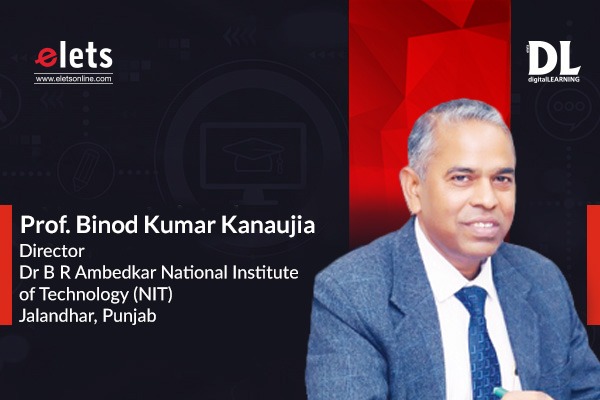
Knowledge is changing at a rapid pace, new thoughts are being developed, and old concepts are being questioned. The prospective students shall have to continuously update their knowledge to stay relevant, writes Prof. Binod Kumar Kanaujia, Director, Dr B R Ambedkar National Institute of Technology (NIT), Jalandhar, Punjab in an exclusive interview with Sheeba Chauhan of Elets News Network (ENN). Edited excerpts:
Recently, UGC introduced cyber security courses for HEIs. How cyber security courses are going to create awareness among the students regarding cyber-attacks and risks on the internet. Do you have any cyber security programme at your institute?
As more and more things getting digitalised, enterprises are becoming apprehensive of disruptions, access denials, infiltration of devices, hijacking, data theft, data destruction, fake data etc. At the same time, any complication or restriction in access of data can prove to be counterproductive. Therefore, there is a higher need for adopting granular approach to cyber security, in which access protocols are required to be redesigned with greater sophisticated identification and authorisation. Yes, our institute is offering M Tech Programme in Computer Science and Engineering (Information Security) so as to prepare students to deal with the aforesaid issues.
How is your institution leveraging AI to prepare higher education students for the rapidly evolving job landscape and the changes it brings?
AI is no more in the state of infancy; it is maturing now and becoming a mainstream tool at a very rapid pace. Organisations need services across entire data value chain, right from data acquisition, storage, Machine Learning and algorithm training. Higher education institutes should transform students into industry-ready data scientists who can contribute to organisational efficiencies and productivity through automation of processes. Our institute has established a Centre for Artificial Intelligence that will explore opportunities for the applications of Artificial Intelligence with efficacy. The institute is also offering M.Tech programme in Artificial Intelligence.
Your university is working on a lot of short term courses. How do you propose short-term courses beneficial in comparison to the long term courses?
One must keep learning irrespective of age and education that one possesses. Short-term courses add value in terms of gaining skills, learning about new tools and techniques, and learning new languages. Not only students, but working professionals can also gain from short-term courses, who otherwise can’t leave their work to gain more knowledge. One can gain knowledge or expertise comfortably with greater flexibility and without compromising work-life balance.
As your university has ‘Center for Energy and Environment’. Please let us know what are the various programmes they are working on?
The vision of Center of Energy and Environment is to become a leader in promoting sustainable and equitable use of energy resources while protecting the environment. To reach this destination, the center will work in collaboration with global organisations both from academia and industry for making innovations in terms of developing sustainable energy technology, energy efficiency, remediation of environment, and protection of environment from human-induced energy related environmental change.
The World Education Summit has been igniting transformation in the education industry since its initial edition. What are your thoughts on being a part of the 26th edition of this global platform on 4-5 July in New Delhi?
Education should continue to remain transformational instead of becoming transactional. Education system should focus upon holistic development of individuals who should be able to think critically. In this endeavour, there is high need to provide interdisciplinary multi-disciplinary and trans-disciplinary education. Technology is playing a big role in education these days.
Education systems should use technology to increase their reach to the masses at an affordable cost, so that people from deprived sections of the society, the destitute shall have equal access to education. The education system should not merely focus on transference of knowledge. It should make students capable of generating knowledge.
Knowledge is changing at a rapid pace, new thoughts are being developed, and old concepts are being questioned. The prospective students shall have to continuously update their knowledge to stay relevant. The education systems need to make provisions to facilitate the aspirants through hybrid modes. Further, the generational gaps should also be acknowledged and faculty should know better about the learners of new generations.




















